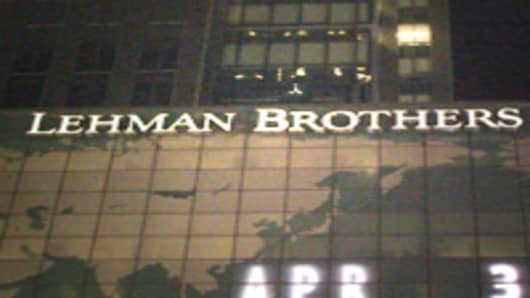Lehman Brothers Holdings believes raising capital is only one of "dozens" of options that the bank would pursue if the right market opportunity presented itself or if the firm thought it would help investor perceptions, a source familiar with the situation told Reuters.
There was talk in the markets that Lehman would have to raise capital as part of its plan to deleverage its business, CNBC reported Monday. The investment bank is looking to raise about $3 billion to $4 billion, the Wall Street Journal reported later Monday, citing sources familiar with the matter.
Some analysts agreed there was no urgent need for Lehman to further bolster its balance sheet.
"In our view, there is no immediate need to raise equity capital, and the company would only take this painful step in an effort to cease the drumbeat of negative perceptions," David Trone, an analyst for Fox-Pitt, Kelton, wrote in a research note.
But Lehman shares were down nearly 6 percent in morning trading, making it the top decliner among brokerage stocks and bringing its fall so far this year to about 50 percent.
By comparison, the Amex Securities Broker Dealer index is down 21 percent in 2008.
Lehman Brothers spokeswoman Kerrie Cohen declined to comment on a report in The Wall Street Journal that Lehman was considering raising billions of dollars in fresh capital.
The newspaper quoted analysts and Wall Street executives as saying Lehman was likely to seek $3 billion to $4 billion.
The Journal said the plans suggest the investment bank will post a loss for the quarter ended in May deeper than the $300 million that various analysts have been expecting.
Lehman may issue common stock, diluting current shareholdings, and will probably reveal its capital plans when it reports quarterly results the week of June 16, the WSJ said.
Lehman's market value is about $18.7 billion, based on Monday's closing stock price of $33.83, Reuters data shows.
Lehman shares, which on Monday fell 8.1 percent to close at $33.83, their lowest level since the bank's stock swooned in March amid panic over the meltdown of rival Bear Stearns, were little changed in premarket electronic trading after initially falling about 3 percent.
Lehman shares have nearly halved this year.
According to recent analysts' research notes, Lehman has been hurt by hedges used to offset losses in various securities.
Second-quarter losses from asset write-downs and ineffective hedges are likely to top $2 billion, the newspaper said. The bank will also realize losses tied to job cuts, the WSJ said, citing a person familiar with the matter.
Lehman in May decided to cut around 1,300 jobs, or nearly 5 percent of its work force, a person briefed on the matter said. It had laid off more than 5,000 people since the middle of 2007.
Lehman is the smallest of Wall Street's four major investment banks, following JPMorgan Chase's purchase this weekend of Bear Stearns. Several analysts expect Lehman to post a second-quarter loss, according to Reuters Estimates.
"The market is very cautious about developments with troubled financial firms," said Hideaki Inoue, chief manager of forex trading at Mitsubishi UFJTrust Bank in Tokyo.
Financial institutions globally have suffered more than $350 billion of write-downs or credit losses tied to risky subprime mortgages and other debt.
Many have raised billions of dollars of capital, including Merrill Lynch and Morgan Stanley.
Standard & Poor's on Monday cut its credit ratings for Lehman, Merrill and Morgan Stanley, saying that write-downs "may continue to depress earnings."
In April, Lehman Chief Executive Richard Fuld had said "the worst is behind us," in light of improved client trading activity and investor sentiment.
Two months ago, Lehman sold $4 billion of preferred shares, a stock-bond hybrid. In early May, Lehman sold $2 billion of 30-year bonds.
Lehman is no stranger to worries about its cash problems. In 1998, Fuld had to fight off concern about Lehman's survival after the Long Term Capital Management hedge fund collapsed.
Raising new capital may help Lehman reassure investors who have in recent months questioned whether it might suffer the same fate as Bear.
Since the Federal Reserve began allowing investment banks to borrow directly, Lehman has accessed overnight financing several times, and fears of a broad market collapse have lessened.
Still, the credit crisis is expected to keep haunting markets. "Credit turmoil should persist though the market reaction might be less pronounced," said Thomas Lam, senior Treasury economist with United Overseas Bank in Singapore.
Last month, David Einhorn of Greenlight Capital Inc, who has sold Lehman shares "short" because he expects a decline, told investors that Lehman should raise large amounts of capital because it has not taken enough write-offs for bad assets.
-- Reuters contributed to this report


